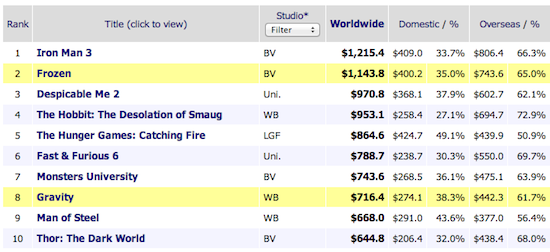The U.S. domestic box office is no longer the place where movies win or lose. The international box office has become a force to be reckoned with and can be counted on many times to turn a struggling U.S. movie into a bone fide hit.
Here’s a breakdown of the top 10 movies in 2013 and where their revenues came from:
International Box Office
What’s really astounding this year though is a movie like Captain America: The Winter Soldier. It set new records in the domestic U.S. with an opening weekend of $90+ million but it did an additional $75+ million internationally the same weekend (and it was only in 32 markets, expanding to more afterwards). Not less than five years ago, a movie like this (with the word “America” in the title and a guy wearing red, white, & blue) would have done 80%+ of its revenue in the U.S. Now that gap is closer to 60% (U.S.) / 40% (International) and the difference is closing fast.
Many big summer tentpole films are opening Internationally first. The Amazing Spider-Man 2 had already been playing for several weeks internationally before it released May 2 in the U.S. Hollywood has caught on, the international market is big business and as movie studios put more and more money into fewer and fewer films, increasing their risk exposure to a big failure, international box office is making the difference.
What does this have to do with books?
Releasing a novel used to be all about the U.S. domestic market. It still is for the most part. But what’s interesting is that the book industry seems to be following a similar trend to the film industry. Books are lagging about 5 years behind in terms of the trends but we can expect books and especially eBooks to be huge internationally within the next 5 years. Markets like the UK and Germany are already exploding. Authors who can’t compete with the small number of books that the big publishers push in the U.S. are having huge success outside of the U.S.
How to take advantage of the international book market today?
Here are a couple of tips to make the most of your book’s international potential:
Negotiate your international rights separately for your book. Make sure you are giving your book the chance it deserves in alternate markets beyond the U.S. It might also be a good idea to get an agent to help you exploit foreign rights.
Translate your book for foreign markets. Joanna Penn wrote a great blog post about how to know what market your book would be best for.
Determine which genre your book is best for. Germany and the UK have tastes similar to U.S. readers but places like Turkey do better with educational non-fiction or romance novels for instance.
We are fast approaching the day when international book sales will exceed U.S. domestic. The world is getting smaller all the time and the ranks of readers are growing faster than ever worldwide.

